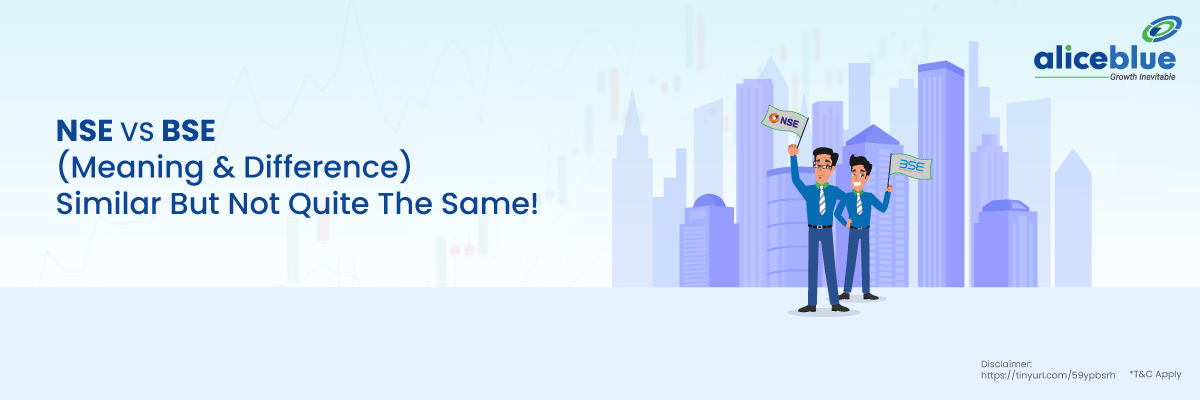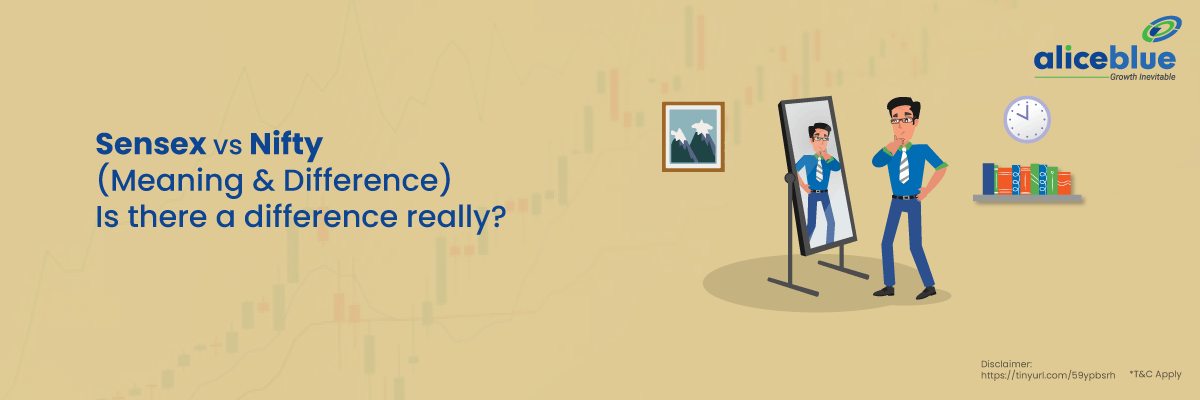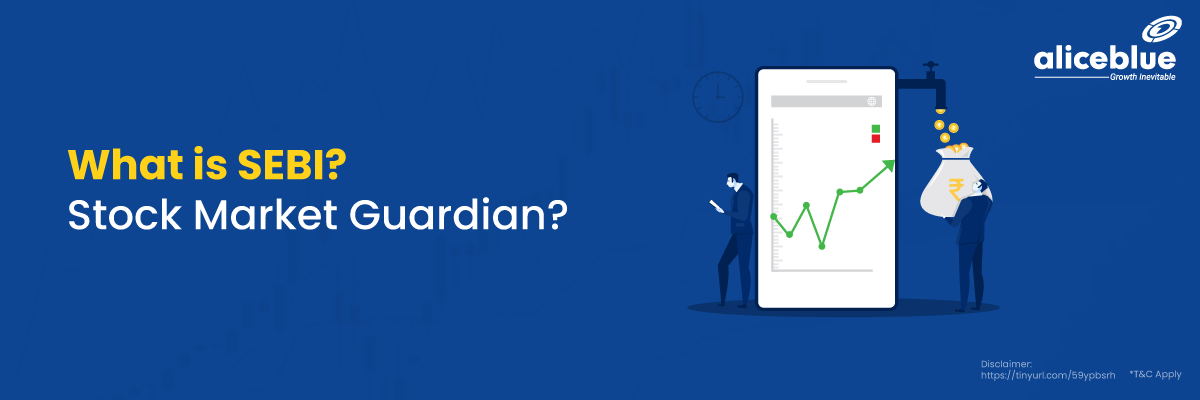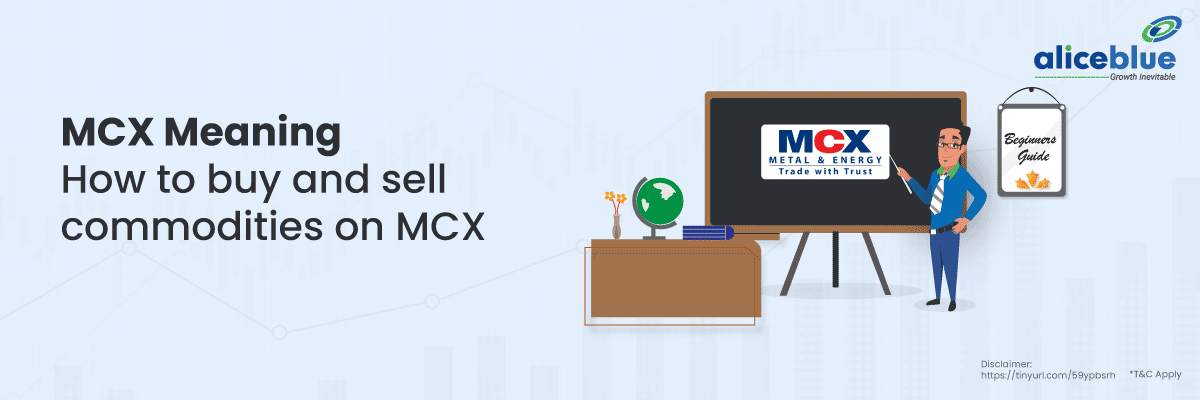NSE and BSE are stock exchanges in India, and all Listed Companies in India are present on them. Stock Exchange (NSE/BSE) is an electronic platform where various financial instruments like Stocks, Derivatives, Bonds, ETFs, etc., are listed.
Content:
What is NSE and BSE?
NSE and BSE are stock exchanges in India, and all Listed Companies in India are present on them. Stock Exchange (NSE/BSE) is an electronic platform where various financial instruments like Stocks, Derivatives, Bonds, ETFs, etc., are listed.
Although both NSE and BSE serve a similar purpose, they have different stories. Let’s explore their stories below.

NSE Meaning
NSE stands for National Stock Exchange; it is the Biggest Stock Exchange in India in terms of Market Capitalization. It was incorporated in 1992, recognized as a stock exchange in 1993, and started off operations in 1994. It revolutionized the trading industry by introducing electronic or screen-based trading in India.
During the year 1995 – 1996, NSE launched Nifty 50 – the benchmark index of NSE. Nifty 50 tracks the 50 largest and most liquid stocks out of more than 1600 stocks listed on NSE. These 50 largest companies represent different industrial sectors which collectively represent the Indian economy.
So tracking the Nifty 50 will help you get a clear view of the Stock Market and Economic Trends of India as a whole. You can check out the Nifty 50 companies here.
Over the past 20 years, the National Stock Exchange has achieved various milestones and has received the following awards recently:
- World’s Largest Derivative Exchange in terms of contracts traded.
- Index provider of the year.
- ETF Index provider of the year.
Learn everything about NSE here!
BSE Meaning
BSE stands for Bombay Stock Exchange; it is the first ever stock exchange in Asia, incorporated in 1875. Over the past 140 years, BSE has come a long way and provides trading in financial instruments like equity, currencies, debt instruments, derivatives, and mutual funds.
BSE has various subsidiaries like:
- BSE SME, India’s largest SME Platform with over 250 companies listed on it.
- BSE StAR MF, India’s largest mutual fund platform with over 2.7 million transactions and more than 2 lakh new SIPs per month.
- BSE Bond is a market leader in the bond market with 2.09 lakh crores worth of fundraising from 530 issuances in the financial year 2017 – 2018 alone.
Sensex, also known as the Sensitive Index, is the benchmark index of BSE. It tracks 30 very large and well-established companies across different industrial sectors, which represent the Indian Economic Trends and Stock Market as a whole. You can track the performance of these 30 companies here.
Sensex is internationally traded on Eurex and various leading exchanges of Brazil, Russia, China, and South Africa.
Difference between NSE and BSE
| NSE | BSE | |
| Full Form | NSE Full Form – National Stock Exchange | BSE Full Form – Bombay Stock Exchange |
| Incorporation | NSE was established in 1992 | BSE was established in 1875 |
| Benchmark Index | NIFTY 50 | SENSEX |
| Headquarters | NSE is located in Mumbai. | BSE is also located in Mumbai. |
| Companies listed | 1696 companies are listed on NSE. | 5749 companies are listed on BSE. |
| Products | 1. Equity 2. Equity, Currency, and Commodity Derivatives3. Exchange-Traded Funds4. Mutual Funds5. Security Lending & Borrowing Scheme 6. Corporate Bonds 7. Initial Public Offering (IPO)8. Institutional Placement Program (IPP)9. Offer for Sale | 1. Equity 2. Equity, Currency, and Commodity Derivatives3. Exchange-Traded Funds4. Mutual Funds5. Corporate Bonds 6. Initial Public Offering (IPO)7. Offer for Sale |
| SME Platform | NSE Emerge | BSE SME |
| Market Capitalization | 2.27 Trillion | 2.1 Trillion |
| Liquidity | High Liquidity | Low Liquidity |
| Index Value (as of 23rd November 2020) | 12,848 | 43,834 |
| Global Rank | 11th | 10th |
| Website | www.nseindia.com | www.bseindia.com |
We hope that you are clear about the topic. But there is more to learn and explore when it comes to the stock market, and hence we bring you the important topics and areas that you should know:
| What is Sensex? |
| What is NSE Full Form? |
| What is Nifty? |
| MCX Meaning |
| What is SEBI |
| Sensex vs Nifty |
| BTST Trading |
| Nifty 50 Companies |
Quick Summary
- NSE and BSE are stock exchanges in India, and all the listed companies are present here. It is an electronic platform where various financial instruments, such as stocks, derivatives, ETFs, etc., are listed.
- NSE (National Stock Exchange). It is the biggest stock exchange in India in terms of market capitalization. Nifty 50 is the benchmark of the NSE, which tracks the 50 largest and most liquid stocks out of more than 1600 stocks.
- BSE (Bombay Stock Exchange). It is the first-ever stock exchange in Asia. Sensex, which is known as the sensitivity index, is the benchmark index of BSE. It tracks down 30 large and established companies.
FAQ (Frequently Asked Questions)
1. Can I buy in NSE and sell in BSE?
Yes, you can buy on NSE and sell on BSE via intraday and deliver shares. It is called arbitrage trading.
2. What is the Difference between NSE and BSE share prices?
Yes, there is a slight difference in the prices of the same stock on NSE and BSE. For example, If XYZ stock is trading at ₹ 50 on NSE, it may be trading at ₹ 49.5 on BSE, depending on how liquid the stock is. In the case of illiquid stocks, the difference in prices may be higher.
3. BSE or NSE, which is better for beginners?
Both BSE and NSE are suitable for beginners, but which is better suited can be ascertained depending on the kind of investor the beginner is.
If you are a beginner who wants to trade on Intraday Basis, NSE will be suitable for you as it has better volume and liquidity.
If you are a seasoned investor, BSE would be suitable for you as you would not have to worry a lot about daily volume and very good liquidity.
4. How many companies are in BSE and NSE?
5749 companies are listed on BSE, and 1696 companies are listed on NSE.
5. Where to invest in NSE or BSE?
You should invest via NSE if you are an intraday trader or someone who wants to trade in derivatives (futures and options).
You should invest via BSE if you are a seasoned investor who buys today and sells after a month, year, or decade.
6. How to calculate BSE and NSE?
NSE (Index) is calculated using the formula: Current Market Value / Base Market Capital x 1000.
BSE (Index) is calculated using the formula: Total free-float market capitalization / Base market capitalization x Base index value.
7. How does a company get listed on BSE or NSE?
Companies get listed on BSE or NSE by issuing shares via Initial Public Offering (IPOs) on the respective platforms.
8. Can a company be listed in both BSE and NSE?
Yes, a company can be listed on both BSE and NSE. In fact, most big companies are listed on both BSE and NSE.
9. What is the timing of BSE and NSE?
The timing of BSE and NSE for Equities is the same, from 9:15 am to 3:30 pm.
10. How come NSE became more popular than BSE?
NSE became more popular than BSE as it introduced derivatives, i.e., Futures & Options in India. NSE revolutionized the trading industry by introducing electronic or screen-based trading in India. Electronic trading brought huge transparency in the industry and hence gained great trust from investors.
Also, NSE has higher liquidity compared to BSE which allows traders to buy and sell the stocks at the desired price.







